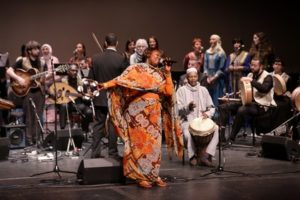 Category: Grantee Spotlight
Category: Grantee Spotlight
Founded in 2003 by Nabila Mango and Haya Shawwa Ben-Halim, Zawaya has operated as a safe space for Arab artists to freely express themselves. Nabila and Haya sought to give the Arab community a voice and address certain stereotypes and misconceptions through the arts. Zawaya has various musical groups dedicated to showcasing the beauty of the Arab culture and the talent of the various artists, providing a rich cultural experience to residents in the Bay Area. CAAP recently had a chance to speak with co-founder Nabila Mango. Continue reading to learn more about Zawaya, one of our 2017 grantees.
CAAP: What are some recent organizational accomplishments that stand out?
Zawaya: In the past couple years, Zawaya has focused much of its attention on creating a space for communities under pressure to collaborate as means of bridge-building and fostering solidarity. By staying current with the ever-changing political climate and organizing multicultural inter-community events that reflect this climate, we have been able not only to exponentially broaden our audience, but also to educate it on the importance of pluralism and diversity.
CAAP: What are some exciting, upcoming initiatives at your organization?
Zawaya: The current season for our Arabic music ensemble, Aswat, is focused on the theme of Dreamer, Immigrant, and Refugee resistance. We feel that with the current political climate, it is important for the Arab community to stand in solidarity with other oppressed communities, because collaboration in the arts is the best medium to create lasting impressions of understanding and unity. For this reason, we have reached out to our good friends Vukani Mawethu and San Jose Taiko as well as our new collaborator La Peña Community Chorus to plan a multicultural inter-community concert celebrating Immigrants, Refugees, and Dreamers. It will showcase the diversity of our San Francisco Bay Area community through music, poetry, spoken word, and dance. Aswat Ensemble will teach the other groups Arabic songs and also learn new songs in English and Spanish to be performed alongside the other three groups. A Musical Refuge: Salute to Dreamer, Immigrant, and Refugee Resistance will be free for all to attend and take place at the Islamic Cultural Center of Northern California in Oakland on January 27th, 2018.
CAAP: What is your organization’s role in empowering the Arab American community?
Zawaya: All of Zawaya’s programs are aimed at preserving and empowering the Arab American identity. Our musical ensembles and classes largely involve educating Arabs and non-Arabs in Arab music theory and the Arabic language. For many of our members who are immigrants and refugees, this allows them a safe space to express themselves through the arts in a way that allows them to maintain their cultural heritage and identity.
Maintaining cultural identity is especially important for our Aswat Youth Ensemble as most members were born here in the US. By introducing them to this part of their culture, we allow them not only to grow artistically but to maintain aspects of the heritage that may not have been aware of otherwise.
Aswat Women Ensemble is another one of our groups and is focused on empowering women through Arab music. Our program not only welcomes but encourages women to excel in the arts. Aswat Women Ensemble is the only Arab music ensemble in the United States made entirely of women.
CAAP: Please share a story of an individual or family that has benefitted from your work.
Zawaya: Salma Hagag, also known under the stage name of Salma El Assal, is a Sudanese singer who left Sudan in the 90’s due to strict militaristic religious rule that prevented women from participating in the arts publicly. At that time, women who performed in public were shamed and punished. She first found a home in Egypt where she joined a band and continued to wow audiences with her powerful voice and performances. While in Egypt, she married, had four daughters and toured with her band.
When political tensions in Egypt began to boil over during the Arab Spring of 2011, Salma sought refuge in the San Francisco Bay Area. Here she took a break from performing in public, while she focused on building a whole new life for her and her family. After years of hard work, she was finally able to bring her daughters from Egypt. However, prior to her husband arriving, Executive Order 13769 was enacted, banning people from 7 Muslim-majority countries including her own, Sudan.
When the Executive Order was announced, Zawaya quickly planned an event aimed at celebrating the music and culture of the 7 countries and, while searching for performers from Sudan, Salma’s name came up. We met with her and she agreed to join the Aswat Ensemble and sing at our concert —Notes Against the Ban: A Musical Response from the 7– where she received a standing ovation for her performance. As a result, Salma has been invited to perform at a number of events throughout the United States.
CAAP: How has funding from CAAP propelled your organization towards fulfilling its mission?
Zawaya: CAAP’s contributions have allowed us to step up the quality of our productions. Funding from CAAP has contributed towards Aswat Women hiring musical director Basma Edrees– a professional violinist and Julliard graduate. It has also contributed towards important professional development for our Vocal Director, Rana Mroue, who trains both Aswat Ensemble and Aswat Women Ensemble. CAAP contributions have also given us the means to establish an Arab music program for San Francisco Public Schools aimed at preserving the cultural identity of refugee children from Yemen, Syria, Iraq and Somalia.
CAAP is proud to support the work of Zawaya and the many Arab musicians who have a found a voice thanks to Zawaya’s dedication to their cause. Learn more about our grantees and visit our grants database to view a list of our 2017 grantees!